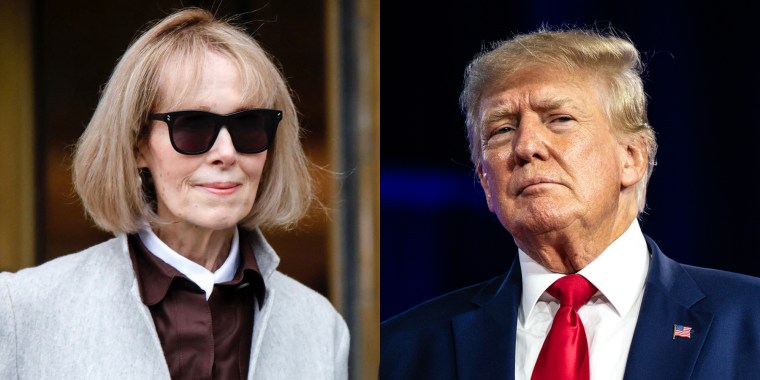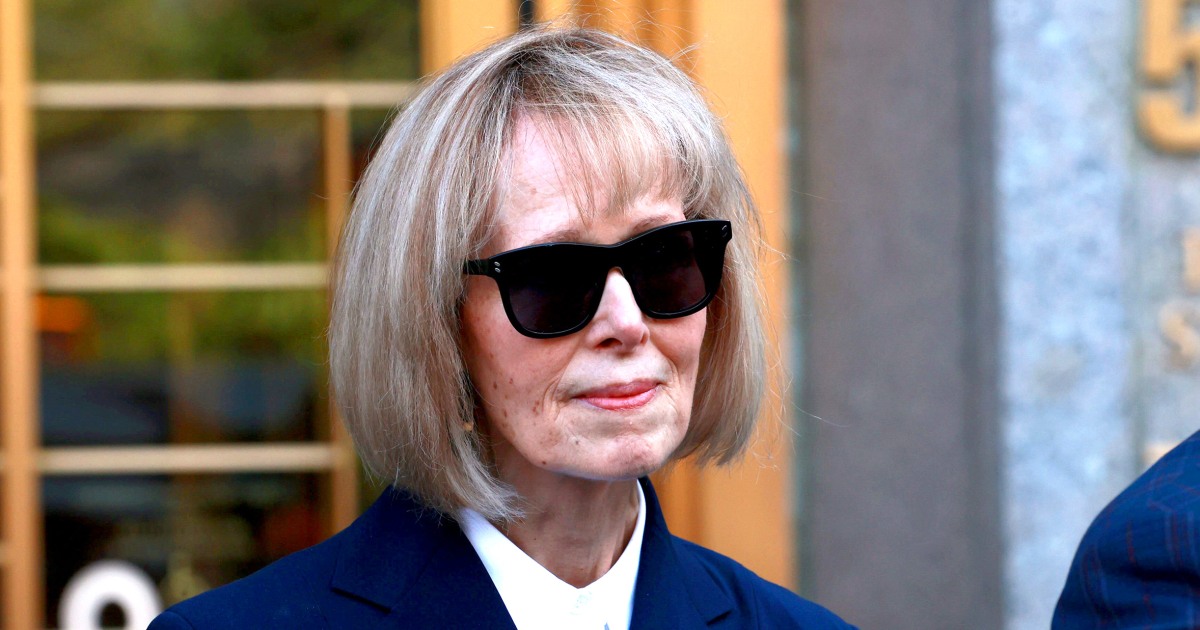Former President Donald Trump attended his defamation damages trial in New York on Tuesday, sitting roughly 10 feet away from E. Jean Carroll, the writer whom a civil jury last year said he was responsible for sexually abusing in the 1990s.
Trump was in the courtroom for jury selection but left before opening statements began to go to a campaign rally in New Hampshire. He was not present when Carroll’s attorney Shawn Crowley told the jury how Trump had upended her client’s life and that they needed to return a verdict large enough to “make him stop” targeting her.
“We submit that number should be significant. Very significant,” Crowley said.
In a post to his Truth Social platform hours after his projected victory in Monday’s Iowa caucuses, Trump called the case a “giant election interference scam.” He added, “I had no idea who this woman was.”
Trump’s quick hop from a victory speech on Monday night in Iowa to a courtroom in New York on Tuesday morning to a rally in New Hampshire Tuesday night is a microcosm of the former president’s coming year, when he’s expected to oscillate between campaigning and court cases, including four pending criminal trials.
Trump, who is expected to attend Wednesday’s proceedings as well, arrived in the courtroom at 9:40 a.m. ET, and took his seat at the defense table. Carroll was seated two rows in front of him and did not turn around. It’s believed to be the first time the two have been in the same room in more than 25 years. During a break later in the day, Carroll walked out of the courtroom and passed by Trump, who had his back to her.
Trump appeared attentive as U.S. District Judge Lewis Kaplan questioned potential jurors. At one point, the judge asked whether anyone in the pool of about 50 people believed that the 2020 election was stolen; after two people said yes, Trump looked over to see which ones. One of the two also answered affirmatively when asked whether they thought Trump was being treated unfairly by the court system.
Neither was among the nine jurors eventually selected.
The judge has already found Trump liable for defaming Carroll in remarks he made as president in 2019 mocking her sexual assault claim. The jury’s only task will be to decide how much money she should get for those remarks, as well as others Trump made after a different jury last year found him liable for sexual abuse and defamation.
In a post on Truth Social on Tuesday morning as he was sitting in the courtroom, Trump blasted Carroll’s account as “fabricated lies and political shenanigans,” and wrote that the judge has “been unable to see clearly because of his absolute hatred of Donald J. Trump (ME!).”

In her opening statement, Crowley told the jury that Trump “didn’t just deny the assault” when Carroll first came forward, “he went much, much further. He said he had no idea of who she was. He accused her of lying and making up a story to make money and to advance some political conspiracy against him. And he threatened her. He said she should pay dearly for speaking out against him.”
“Donald Trump was president when he made those statements and used the world’s biggest megaphone to attack Ms. Carroll, to humiliate her, and to destroy her reputation,” Crowley said, telling the jury that Trump’s verbal assaults had unleashed a flood of attacks against her from his supporters, threatening and insulting her. There hasn’t been a day since where Carroll has “not been afraid,” Crowley said, adding that Trump’s attacks have continued unabated since last year’s verdict.
“He sat in this courthouse this morning. And while he was sitting there, he posted more defamatory statements, more lies about Ms. Carroll and this case. By our count, by our last count, 22 posts, just today. Think about that. Think about that when you consider how much money will it will take to get him to stop,” she said.
“It’s time to hold him accountable.”
Trump attorney Alina Habba countered that Carroll’s reputation has “was not harmed. It’s the opposite. She has gained more fame and more notoriety than she could ever have dreamed of.”
Habba told the jury that Carroll “has been thrust back into the limelight like she always wanted” and “is looking for you to give her a windfall because some people on social media said mean things about her.”
“She doesn’t want to fix her reputation,” Habba said. “She likes her new brand and she has been monetizing it for years.”
Testimony is scheduled to begin Wednesday morning, with Carroll expected to be the first witness to take the stand.
Carroll is seeking at least $10 million for the damage Trump caused to her reputation and most likely several times that amount in punitive damages for continuing to publicly call her account of his sexual abuse a “con job” on TV and social media and at his rallies.
Trump has said he plans to testify in his own defense. “I’m going to explain I don’t know who the hell she is,” he told reporters Thursday.
In a court filing Friday, Carroll’s lawyer Roberta Kaplan said Trump had already been found liable for the assault and, under an earlier order from the judge, could not relitigate the issue from the witness stand. She urged the judge to pre-emptively rein in Trump.
“If Mr. Trump appears at this trial, whether as a witness or otherwise, his recent statements and behavior strongly suggest that he will seek to sow chaos,” her filing said. “Indeed, he may well perceive a benefit in seeking to poison these proceedings, where the only question for the jury is how much more he will have to pay in damages for defaming Ms. Carroll.”
“This Court should make clear from the outset that Mr. Trump is forbidden from engaging in such antics and will suffer consequences if he does so,” she added.
Habba argued in a filing Sunday that Kaplan’s request was “not appropriate” and should be rejected. She said Trump plans to testify about his state of mind when he made his comments about Carroll and also plans to discuss “Ms. Carroll’s continuous parade of interviews” when she first went public.
In a ruling late Sunday, the judge said simply that the court “will take such measures as it finds appropriate to avoid circumvention of its rulings and of the law.”
Trump’s attorneys — who previously tried several times to delay the trial — had also asked in a separate court filing if the proceedings could be pushed back a week because of the funeral for Melania Trump’s mother, Amalija Knavs, on Thursday. The filing said Trump would be traveling with his family to Florida on Wednesday for the services and noted that the court is not in session on Fridays.
Kaplan denied the request but said Sunday that if Trump’s team wraps up his defense on Thursday, he would allow Trump to return to court to testify next Monday.
He also noted that despite Trump’s assertion that Wednesday is a family travel day, “Mr. Trump has scheduled a campaign appearance at 7 p.m. on Wednesday, January 17, 2024 in Portsmouth, New Hampshire.”
Habba asked again Tuesday morning, before the jurors were called in, to postpone the trial so that Trump, who is under no obligation to be in court, wouldn’t have to miss part of the trial while attending the funeral. Trump shook his head as Kaplan denied the request.
The trial, which is expected to last four days, is the second involving Carroll and Trump.
In a trial before the same judge last year, a jury found Trump liable for sexually abusing Carroll, a magazine writer, in the dressing room of a Manhattan department store in the mid-1990s and for defaming her after he left the White House by calling her a “wack job” and her story a “hoax,” among other insults. The jury awarded her $5 million in damages, a verdict Trump is appealing.
Trump had said he would testify in that case as well but he ultimately did not.
Carroll’s attorneys used — and according to court filings plan to use again — parts of the hourslong videotaped deposition Trump sat for in the case in October 2022 during the trial. In the deposition, Trump called Carroll’s claims a “big fat hoax” and “pure fiction” and insisted that “physically, she’s not my type.”
During questioning, he was shown an old picture of him and Carroll standing together at an event and mistook her for his wife at that time, Marla Maples. “That’s Marla. Yeah, that’s my wife,” he said. After the mistake was pointed out, he said the picture was “very blurry.”
Trump’s lawyer in the appeal in that case, Joe Tacopina, told NBC News on Monday he had withdrawn from representing Trump in the case and also from his New York criminal case alleging that Trump falsified business records. Tacopina, a longtime high-profile New York lawyer, declined to comment further, which was first reported by The New York Times.
Carroll went public in 2019 with her claim that Trump raped her. She was able to sue Trump over the rape allegation in 2022 after New York passed a law that opened a one-year window for adult victims of sexual offenses to file civil suits, even if the statute of limitations on their claims had expired, as it had for Carroll.
The jury didn’t find Trump liable for rape as defined under New York criminal law but did find him liable for sexual abuse.
As a result of that verdict, Kaplan found Trump liable for defamation in this new case, which centers on the then-president’s claim he had never met Carroll and assertions that she’d made up the story for publicity for her book and had been paid cash to concoct the story.
“It is a disgrace and people should pay dearly for such false accusations,” Trump said in a statement on June 21, 2019.
Carroll is seeking more money in this case than in the last, arguing Trump’s remarks as president caused her more harm than the comments he made about her after his presidency.
The judge’s liability finding greatly limits Trump’s ability to defend the case, because he can’t deny responsibility for the assault. In court filings in November, Trump’s team said it plans to argue that Carroll “did not sustain any reputational or economic harm as a result of the Statements” and that if she did, any such harm was minimal. The judge told potential jurors that Trump’s attorneys contend Carroll should receive “nominal” damages and no punitive damages.
As in the first trial, the judge will use an anonymous jury because of “the strong likelihood of unwanted media attention to the jurors, influence attempts, and/or harassment or worse by supporters of Mr. Trump [and/or by Mr. Trump himself].”
He ordered that jurors’ names, addresses and workplaces not be revealed and said the panel will be picked up from and dropped off at an undisclosed location each day.
